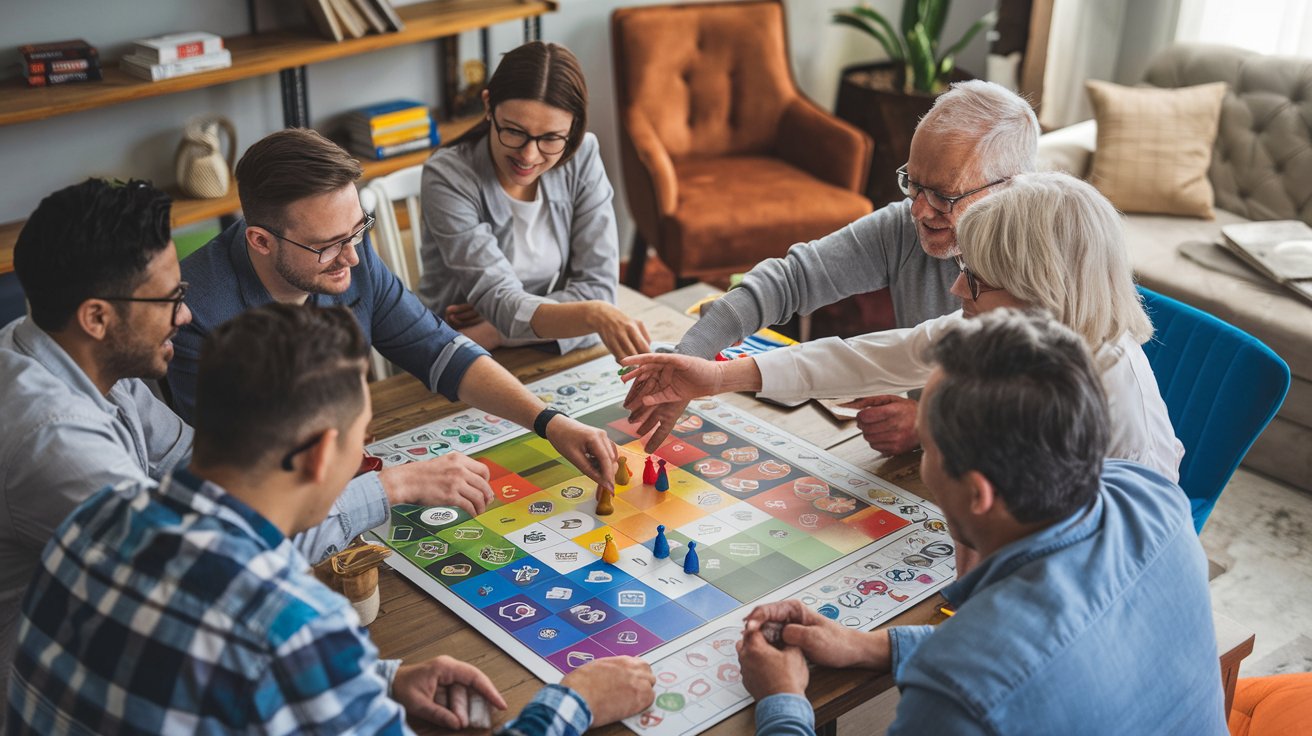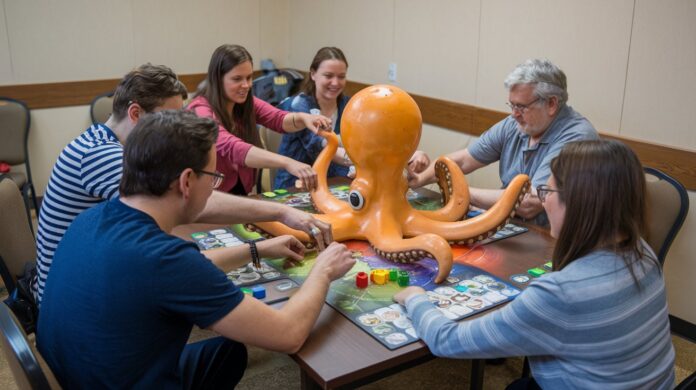Cooperative games are a refreshing departure from the competitive frenzy of traditional gaming. Instead of battling against each other, players unite to achieve a common goal, fostering teamwork, communication, and camaraderie. Whether you’re escaping a haunted mansion in Betrayal at House on the Hill, surviving a zombie apocalypse in Dead of Winter, or saving the world in Pandemic, cooperative games deliver thrilling, collaborative experiences. In this comprehensive 1500+ word guide, we’ll explore how to play cooperative games, master their mechanics, and work together for the ultimate gaming experience. Packed with game recommendations, strategies, and tips for building strong teams, this SEO-optimized blog will help you and your group thrive in the world of co-op gaming. Let’s team up and dive in!
What Are Cooperative Games?
Cooperative games, often called co-op games, are tabletop or video games where players work together toward a shared objective rather than competing against one another. These games emphasize collaboration, strategy, and problem-solving, with success depending on how well the group coordinates. Unlike competitive games where there’s one winner, co-op games typically pit players against the game itself, creating a “players vs. system” dynamic.
Popular examples include:
- Pandemic: Players are a team of specialists racing to cure deadly diseases before they wipe out humanity.
- Forbidden Island: A group of adventurers work together to capture treasures from a sinking island.
- Left 4 Dead 2: A video game where survivors cooperate to fend off zombie hordes.
- Gloomhaven: A tactical board game where players team up for epic fantasy campaigns.
Cooperative games are perfect for friends, families, or coworkers looking to bond over shared challenges. They come in various formats—board games, card games, and video games—and cater to all skill levels and interests.
Why Play Cooperative Games?
Cooperative games offer unique benefits that make them a fantastic choice for group entertainment:
- Team Building: Strengthen relationships through collaboration and mutual support.
- Inclusivity: Focus on group success reduces pressure on individual performance, welcoming players of all abilities.
- Engaging Stories: Many co-op games feature rich narratives that immerse players in thrilling scenarios.
- Problem-Solving Skills: Develop critical thinking, planning, and communication through complex challenges.
- Replayability: Dynamic mechanics and variable outcomes keep games fresh for multiple sessions.
Whether you’re hosting a game night or connecting online, cooperative games create a sense of unity and shared triumph. Let’s explore how to get started and maximize your co-op gaming experience.
Getting Started with Cooperative Games
1. Choose the Right Game
Selecting a cooperative game that suits your group is crucial. Consider these factors:
- Group Size: Some games, like Pandemic, work best with 2–4 players, while others, like Dead of Winter, scale well for larger groups.
- Complexity: Beginners might enjoy accessible games like Forbidden Island, while seasoned gamers can tackle Gloomhaven’s intricate mechanics.
- Theme: Pick a theme that excites your group, such as sci-fi (Star Wars: Imperial Assault), horror (Arkham Horror), or adventure (The Crew).
- Playtime: Quick games like The Mind take 20 minutes, while Spirit Island can last hours.
- Format: Decide between board games, card games, or video games. Video games like Overcooked are great for digital play, while Hanabi shines in person.
Research games through reviews, gameplay videos, or posts on X (search hashtags like #CoopGames) to find the perfect fit.
2. Learn the Rules
Cooperative games can have steep learning curves, so take time to understand the mechanics:
- Read the Rulebook: Most board games include detailed guides. Read aloud or assign a “rules guru” to explain.
- Watch Tutorials: YouTube channels like Watch It Played or Shut Up & Sit Down offer clear walkthroughs.
- Start with a Practice Round: Play a few turns without consequences to grasp the flow.
- Check for Online Modes: Video games like Destiny 2 often have in-game tutorials for co-op missions.
3. Set Up Your Gaming Environment
Create a conducive space for collaboration:
- Physical Setup: For board games, ensure a large table with good lighting. For video games, check internet stability and headsets.
- Team Communication: Use voice chat (e.g., Discord) for online play or ensure everyone can hear each other in person.
- Resources: Keep rulebooks, player aids, or apps (many games have companion apps) handy.
Mastering Cooperative Games

To excel in cooperative games, your group needs to combine strategy, communication, and adaptability. Here are key tips to enhance your gameplay:
1. Understand Roles and Strengths
Many co-op games assign unique roles or abilities to players:
- In Pandemic, roles like Medic or Researcher have specialized skills.
- In Overcooked, players might focus on chopping, cooking, or serving.
- In Gloomhaven, characters have distinct combat styles.
2. Communicate Effectively
Clear communication is the backbone of co-op success:
- Share Information: In games like Hanabi, where players can’t see their own cards, describe what you see clearly.
- Plan Together: Discuss strategies before taking actions, especially in turn-based games like Forbidden Desert.
- Be Concise: Avoid overwhelming the group with too much chatter. Use short, actionable suggestions.
3. Balance Leadership and Collaboration
Co-op games can suffer from “alpha player” syndrome, where one person dominates decisions. To avoid this:
- Encourage everyone to contribute ideas, especially quieter players.
- Rotate who leads discussions each round.
- Use voting for major decisions in complex games like Spirit Island.
4. Adapt to Challenges
Cooperative games are designed to be tough, with dynamic challenges like worsening diseases in Pandemic or enemy waves in Left 4 Dead. Stay flexible:
- Prioritize Objectives: Focus on the main goal (e.g., curing diseases vs. treating every city).
- Adjust Strategies: If a plan fails, regroup and try a new approach.
- Manage Resources: Conserve items like cards or ammo for critical moments.
5. Embrace Failure
Losing is part of the co-op experience—games are designed to be challenging. Use losses as learning opportunities:
- Analyze what went wrong (e.g., poor resource allocation or miscommunication).
- Adjust tactics for the next session.
- Celebrate small victories, like completing a tough mission in Gloomhaven.
Top Cooperative Games to Try
Here’s a curated list of cooperative games across different formats, with instructions and tips for maximum enjoyment.
1. Board Games
- Pandemic
- Objective: Cure four diseases before they spread uncontrollably.
- How to Play: Players take turns moving, treating diseases, sharing knowledge, and discovering cures. Coordinate to use roles effectively.
- Why It’s Fun: Tense, strategic, and rewarding when you save the world.
- Equipment: Pandemic board game.
- Forbidden Island
- Objective: Capture four treasures and escape before the island sinks.
- How to Play: Players move across a tile-based island, collecting treasure cards and shoring up flooded tiles. Escape via helicopter.
- Why It’s Fun: Fast-paced and beginner-friendly.
- Equipment: Forbidden Island game.
2. Card Games
- Hanabi
- Objective: Create a fireworks display by playing cards in the right order, without seeing your own cards.
- How to Play: Players give limited clues about others’ cards (e.g., “You have two red cards”). Avoid mistakes to maximize points.
- Why It’s Fun: Unique mechanic encourages subtle communication.
- Equipment: Hanabi deck.
- The Crew: The Quest for Planet Nine
- Objective: Complete missions by winning specific card tricks as a team.
- How to Play: A trick-taking game where players must win cards in precise orders, using limited communication.
- Why It’s Fun: Progressive missions create a campaign-like feel.
- Equipment: The Crew game.
3. Video Games
- Overcooked 2
- Objective: Cook and serve dishes in chaotic kitchens before time runs out.
- How to Play: Players chop ingredients, cook meals, and plate orders while navigating obstacles like moving platforms.
- Why It’s Fun: Hilarious and fast-paced, perfect for local or online play.
- Equipment: Console/PC, controllers.
- Left 4 Dead 2
- Objective: Survive zombie hordes and reach safehouses.
- How to Play: Players fight zombies, heal teammates, and navigate levels. Coordinate to avoid being overwhelmed.
- Why It’s Fun: Intense and action-packed with great replayability.
- Equipment: PC/console, internet.
Building a Strong Co-Op Team
A great co-op experience depends on a cohesive team. Here’s how to foster teamwork and create lasting gaming memories:
1. Establish Group Norms
- Set Expectations: Agree on session length, communication style, and commitment level (casual vs. serious).
- Respect Playstyles: Some players prefer strategy, others enjoy role-playing. Find a balance.
- Encourage Fun: Remind everyone the goal is enjoyment, not perfection.
2. Foster Inclusivity
- Welcome Newbies: Pair inexperienced players with veterans to ease them in.
- Rotate Games: Let different group members choose games to ensure variety.
- Accommodate Needs: Adjust for accessibility (e.g., larger text for board games or voice chat for video games).
3. Communicate Outside the Game
- Plan Sessions: Use group chats or X to schedule game nights and share strategies.
- Build Bonds: Share memes or discuss favorite moments to strengthen friendships.
- Join Communities: Find co-op gaming groups on Discord, Reddit, or X (search #CoopBoardGames or #CoopGaming).
4. Handle Conflicts
- Address Issues Early: If someone feels sidelined, pause to discuss.
- Stay Positive: Focus on solutions, not blame, during tough moments.
- Use Game Tools: Many video games have mute/block options for disruptive players.
Benefits of Cooperative Games
Co-op games offer more than entertainment:
- Stronger Relationships: Build trust and camaraderie through shared goals.
- Mental Stimulation: Enhance problem-solving and strategic thinking.
- Emotional Resilience: Learn to handle setbacks as a team.
- Social Connection: Connect with friends or meet new players online.
- Workplace Skills: Improve collaboration and leadership, applicable to professional settings.
Studies suggest cooperative play can reduce stress and foster a sense of belonging, making these games a valuable social tool.
Overcoming Common Co-Op Challenges
Co-op games come with unique hurdles. Here’s how to tackle them:
- Alpha Players: Encourage group input and use games with hidden information (Hanabi) to limit dominance.
- Difficulty Spikes: Adjust game difficulty (many games offer variable settings) or consult online guides.
- Time Commitments: Choose shorter games (The Mind) for busy groups or break long games into sessions.
- Disengagement: Switch roles or games if someone seems bored.
- Technical Issues: For video games, test connections and update software beforehand.
Conclusion
Cooperative games are a fantastic way to bring people together, combining strategy, storytelling, and teamwork for unforgettable experiences. By choosing the right game, mastering communication, and building a strong team, you can turn any game night into a triumph. Whether you’re curing diseases in Pandemic, cooking chaos in Overcooked, or exploring dungeons in Gloomhaven, the joy of working together is unmatched.
Ready to start your co-op adventure? Gather your crew, pick a game from this guide, and dive into the fun. Share your favorite co-op moments on X with #CoopGames, and let’s celebrate the power of teamwork!

Zareb Saleh is a journalist at Gulf Today and a ghostwriter for Gameoholic, specializing in gaming, technology, and digital culture. With a keen eye for industry trends, he delivers insightful stories that engage and inform readers.




